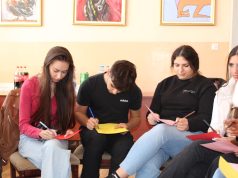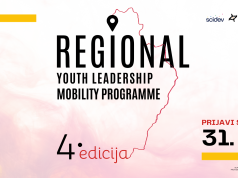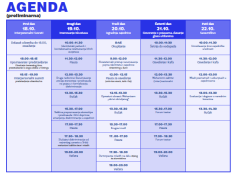 Call for Nominations
Call for Nominations
Where Do We Stand? A Map for Human Rights
Turkey is a country that comprehends a centuries-old mix of ethnicities, languages, cultures, religions and traditions. It is home not only to Turks, Kurds and Armenians, but also many other minorities.
Nonetheless, Turkey has not yet adopted a general antidiscrimination legislation – including any against hate crimes – and discriminatory attitudes are deeply rooted in Turkish society. The legislation is currently being drafted with the contribution of NGOs as well. Turkey’s distinct location bordering both Europe and the Middle East has also made it a key area for the EU’s immigration and asylum policies. The country represents a “gateway” to fortress Europe and its border with Greece has witnessed numerous migrants drowning in the Evros river over the past year alone
It is with this particular situation in mind that, for the first time, we will organise the international UNITED conference in Turkey.
With this call for nomination, we urge activists from across Europe to come together to discuss strategies to tackle hate crime, Islamophobia, to protect refugee rights, and promote minority rights.
Our aim is to develop counter strategies and practical responses to situations of discrimination and intolerance, providing an exchange platform of knowledge and good practice to develop the working methods of local NGOs and promote human rights for all… we have to realise that it is only by taking action UNITED and sharing our knowledge we can create a strong anti-racist movement
There are great challenges in front us all.
The role of the antidiscrimination movement, and its independent actions is very important, and it is our responsibility to work united during this conference to find responses to discriminatory attitudes and practices.
We will make use of a variety of working methods: thematic working groups, plenary sessions and workshops.
Through the working groups below, issues like the ones mentioned above will be discussed. Your contribution will be valuable….
* Legislation for a Hate-Free Atmosphere
Hate crimes are bias motivated crimes that not only target the victim but also threaten the group or community the victim belongs to. It is important to create hate free societies where discrimination is not welcome. The working group will exchange methods and practices to combat hate crime like data collecting, reporting and victim support.
* Last Exit: Accessing Fortress Europe
With Europe as a constant attractive destination for many people around the world, migration management has risen to one of the top policy priorities within the last ten years. And with this, the notion of Europe as an inaccessible fort has been conceived. Different agreements with neighboring countries have played a crucial role in securing the fortress, but in light of the Arab Spring in northern Africa and the middle-east, in what direction is migration policy heading and what is the role for NGOs within this?
* Islamophobia Revealed
In the last few years Islamophobic attitudes have been growing in (European) society. In some countries they have led to new forms of right wing parties and movements. To understand what impact this has on national and European politics and policies it is important to know the historical, social, economic and political background to these attitudes. With a proper analysis we can find counter arguments and strategies against discrimination on cultural and religious grounds.
* Minorities in Europe: A Dialogue for Recognition
The working group will look at the interrelated factors that impact on ethnic, indigenous national, linguistic and religious minority communities in Europe, whether they be access to education, social services, discrimination, participation in political and economic development and other issues… the group will look at what strategies can be developed to address systematically the challenges faced by minorities, in particular how a human rights based approach can be used.
* Make it Loud: Potentials and Dangers in the Media
In the past decade the media landscape has undergone a rapid development that has left activists with both new challenges and possibilities for raising awareness around their cause. With the diversity of today’s media platforms, possibilities are present to almost all organisations regardless of size or location.
We will be exploring the opportunities, the obstacles encountered and the tools and practices we can use within this new landscape.
* Refugees Rights: Suspended Lives?
In this working group we will to discuss refugees’ rights and their equal participation within society.
UNITED is the largest pan-European anti-racist network of more than 550 organisations. With its conferences antiracist and human rights activists from all parts of Europe meet and discuss effective ways of combating racism and discrimination. At a recent UNITED conference held in October 2011 in Macedonia (MK) delegates from 83 organisations from 30 countries look at specific issues, such as strategies for social cohesion and how to work with segregated communities, how to tackle nationalism, election monitoring, Internally Displaced Persons and asylum policies, youth work, the Decade of Roma Rights, the creation of a Minority Rights Network, strategies for a critical approach to the media and many more.
Conference prepared by:
* Say Stop to Racism and Nationalism! -DurDe! (TR)
* Association Solidarity with Asylum-seekers & Migrants (TR)
* Association for Social Change (TR)
* Community Volunteers Foundation (TR)
* Minority Rights Group Europe (H)
* Vereinigung Verfolgten des Naziregimes (D)
* Folkesagen – Worthy Life for Asylum Seekers (DK)
* UNITED for Intercultural Action
____________________________________________________________
Technical Info
Working methods
…plenary sessions, working groups, lectures, workshops, political cafés, presentations, debates, intercultural ‘games’, information market, cultural activities, excursions, open forum.
Participants
The conference is planned for 75 participants (living in the countries of the Council of Europe) who represent (inter)national antiracist, antifascist, refugee, human rights and minority rights organisations. Active grass-roots groups from all over Europe are also invited. Participation is rotated from one conference to another. Priority will be given to nominations from young delegates (under 30 years old) with a minority background. Preference is given to those organisations that actively take part in UNITED campaigns. Participants should act as multipliers, spreading the information to as many people as possible. We will try to reach an equal balance of female/male participants and a good geographical distribution.
Each organisation can nominate only ONE delegate.
Language
The conference language is English. All participants are expected to have at least basic knowledge of English. But don’t worry, English is almost nobody’s mother tongue. If you have difficulties in expressing yourself, surely we can help each other.
With the financial support of:
* European Youth Foundation of the Council of Europe
* Minority Rights Group Europe
* The Matra Programme of the Dutch Ministry of Foreign Affairs
Financial conditions
Participation fee – travel costs
The participation fee of the conference depends on the country where the nominating organisation is based:
120 Euro for participants from group 1:
A, B, CH, CY, D, DK, E, F, FL, FIN, GB, GR, I, IS, IRL, L, M, N, NL, P, S
60 Euro for participants from group 2:
BG, CZ, EE, H, HR, LV, LT, PL, RO, SI, SK
40 Euro for participants from group 3:
AL, ARM, AZ, BH, BY, GE, H, KZ, KY, MK, MNE, MD, RS, RUS, TR, UA, UZB, XZ
Full board & lodging and the complete program is included.
Organisations that paid their 2012 supporter fee to the UNITED Network will receive a 50% reduction of the participation fee. (how to become a supporter)
Contribution to international travel costs
Participants travelling from group 1
A, B, CH, CY, D, DK, E, F, FIN, GB, GR, I, IS, IRL, L, M, N, NL, P, S
UNITED can contribute maximum 70% to the costs of your travel, not more than 250 Euro.
Participants travelling from group 2
BG, CZ, EE, H, HR, LV, LT, PL, RO, SI, SK, TR
UNITED can contribute maximum 80% to the costs of your travel, not more than 250 Euro.
Participants travelling from group 3
AL, ARM, AZ, BH, BY, GE, H, KZ, KY, MK, MNE, MD, RS, RUS, UA, UZB, XZ
UNITED can contribute maximum 90% to the costs of your travel, not more than 300 Euro.
Please look for the cheapest and most environmentally friendly possibility to travel. We strongly encourage you to travel by night-train, bus or other cheaper means of transport to Turkey. In order to be eligible for a contribution to your travel costs you will be expected to attend the whole meeting and to prove your travel expenses providing an original invoice and the original tickets to UNITED.
The cost of your visa can be reimbursed by UNITED on the base of an original invoice from the Embassy.
UNITED conferences can only take place when participants make an effort to contribute financially to their travel costs. We ask you to find out if there are alternative possibilities of funding your participation. Sometimes it is possible to find small local grants (e.g. a travel grant from a foundation, a university, an embassy or another sponsor). We would very much appreciate your help.
Since we have limited sponsored places, delegates that can cover (part of) their own travel costs have a higher chance to be selected.
Date and place
The conference will take place near Istanbul (TR) and will start on Tuesday afternoon 22 May 2012 with a bus transport to the venue.
Departure is foreseen for Sunday afternoon 27 May 2012. If you wish to arrive earlier or stay longer (on your own costs), we can help you to arrange your stay.
Further information
– Please fill in the form (click here for registration form) completely providing all data as requested. If you invest more effort in the application it has more chance to be successful!
– Each organisation can nominate only ONE representative (living in Europe)
– Priority will be given to nominations from young delegates (under 30 years old) with a minority background
– Sending this form to UNITED does not guarantee that you will be selected for the conference – we receive many nominations.
– Only selected candidates will be informed about the result of their selection and receive further information via e-mail in April 2012.
Application procedure
Organisations interested in nominating a delegate should send their nomination (Expression of Interest form-click here for registration form ) by email before the deadline:
28 March 2012 – 24:00 to turkey@unitedagainstracism.org
to download the registration form please click here.











